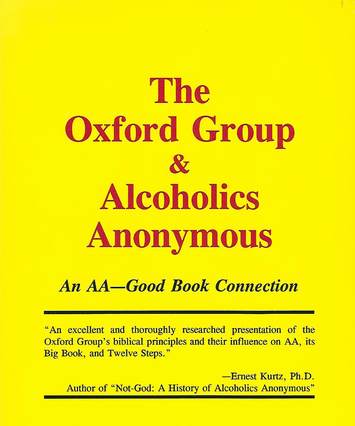About Dick B. (only used this name as per AA protocols)
Dick B. (1925-2015) was an author; "unofficial" historian of Alcoholics Anonymous; retired attorney; Bible student; CDAAC; Christian recovery leader; and an active, recovered member of A.A. with more than 29 years of continuous sobriety. He sponsored over 100 men in their recovery program. He used the pen name "Dick B." to conform to A.A. Traditions.
Dick B. began his quest to learn A.A. history in 1990 when he was about three years sober. A young AA named John came up to Dick in an A.A. Step Study Meeting in Marin County, California. He said: "Dick, did you know that A.A. came from the Bible? They were so fond of the Book of James that they first wanted to call A.A. 'The James Club.'" Dick replied: "John, I have been to more than a thousand meetings; and I have never heard that statement made." John responded, "Why don't you read 'DR. BOB and the Good Oldtimers?'" And Dick B. did. He found that the pages of that A.A. General Service Conference-approved book were surfeited with mention of God, the Bible, prayer, Quiet Time, their Christian Fellowship, their required belief in God, and their required acceptance of Jesus Christ as Lord and Savior in order to come to God. And Dick was intrigued, excited, and off to the races.
Joined by his son Ken B. (a non-alcoholic, ordained minister, teacher, researcher, and businessman): As of September 2015, Dick B. had, for more than 25 years, been researching the origins and history of A.A.; the Christian upbringing of A.A. cofounders Bill W. and Dr. Bob; how the first three AAs got sober; the original A.A. group ("Akron Number One"--which Dr. Bob called "a Christian fellowship"); the literature of A.A. and its members; the founding of A.A. in Akron in June 1935; Bill W.'s "new version of the program," known as the "Twelve Steps," first published April 1939 in "Alcoholics Anonymous" (the "Big Book"); the basic ideas of the Twelve Steps that A.A. cofounder Dr. Bob said that the early AAs got from their teachings, studies, and efforts in the Bible; the fundamental roots of early A.A. in the Bible, the United Society of Christian Endeavor, the Salvation Army, the Gospel rescue missions, the Young Men's Christian Association, the life-changing program of "A First Century Christian Fellowship" (later also known as "the Oxford Group"), Quiet Time, and Christian literature and devotionals of the day. He also researched the impact on early A.A. and its cofounders Bill W. and Dr. Bob of a number of evangelists of the later 1800's, the teachings of Rev. Samuel M. Shoemaker, the teachings of Anne Ripley Smith (Dr. Bob's wife), Professor William James, Dr. Carl Jung, and Dr. William D. Silkworth.
Dick B. and his son Ken also researched Bill W.'s well-known "white light" experience at Towns Hospital in New York during his final stay there for treatment of his alcoholism by Dr. Silkworth from December 11-18, 1934--including key incidents leading up to his December 1934 stay at Towns and the aftermath of his life-changing experience at the hospital, including: (1) Dr. Silkworth's discussion about the "Great Physician" (Jesus Christ) with Bill W. during Bill's treatment for alcoholism at Towns Hospital in September 1934; (2) the good news about overcoming alcoholism that Bill's school mate at Burr and Burton Seminary, Ebby T., brought Bill in late November 1934; (3) Ebby's return visit a few days later with Oxford Group member Rowland H., and the message Rowland carried to Bill then; (4) Bill's hearing Ebby's testimony from the pulpit of Rev. Sam Shoemaker's Calvary Church about December 7; (5) Bill's visit the next day to Calvary Mission (run by Shoemaker's church) to get what his friend Ebby had found (as Ebby had made his personal surrender, involving accepting Jesus Christ as his Lord, at Calvary Mission on November 1, 1934), which visit including Bill W.'s responding to the altar call that day at Calvary Mission; (6) Bill's sharing with his wife Lois that night, which sharing led Lois to state in a recorded, public talk, that Bill had given his life to Christ; (7) Bill's writing to his brother-in-law, Dr. Leonard Strong, that he (Bill W.) had been reborn; (8) Bill's decision to seek the help of the "Great Physician" (Jesus Christ) for the cure of Bill's alcoholism just before entering Towns Hospital on December 11; (9) Bill's announcing to Dr. Silkworth as he entered Towns Hospital that he had "found something;" (10) Bill's further focus while in Towns in December 1934 on the possible role of the "Great Physician" in his life, followed by his crying out to God for help; (11) Bill's life-changing experience in which, Bill reported, his hospital room had "blazed with an indescribably white light," and, as part of that "vital religious experience," Bill also reported that he had sensed the presence of God, and had had the "blazing thought": "Bill, you are a free man. This is the God of the Scriptures."
Dick B. also learned during his research of that critical event in the formation of Alcoholics Anonymous, that, following the events leading up to and including Bill's "vital religious experience" at Towns Hospital, Bill said he never again doubted the existence of God. And Bill never drank again for the rest of his life. In addition, Dick learned that, as part of Bill's experience at Towns Hospital, Bill had a vision of "a chain reaction" in which one "drunk" would carry the message to another drunk. And also in conjunction with Bill's Towns Hospital experience, Bill believed that God had commissioned him to "fix" all the drunks in the the world. Dick also learned that, when Bill was discharged from the hospital on December 18, 1934, he went into the streets, hospitals, and flea bag hotels with a Bible under his arm, telling drunks they must give their lives to God (as he had just done). As "AA Number Three" (Akron attorney Bill D.) shares in his personal testimony in the Big Book, A.A. cofounder Bill W. declared to Bill's D.'s wife in mid-July 1935: ". . . 'Henrietta, the Lord had been so wonderful to me, curing me of this terrible disease, that I just want to keep talking about it and telling people." ["Alcoholics Anonymous," 4th ed., 191].
These were the beginnings of Dick B.'s 25 years of research on the roles God, His Son Jesus Christ, and the Bible played in early A.A.'s astonishing success with "seemingly-hopeless," "medically-incurable" alcoholics, and that they can still play in the recovery of alcoholics and addicts today. Dick's research then turned into a major search for A.A.'s highly-successful "original program," the practices of A.A.'s pioneer members, the proof of their testimonies, and the astonishing successes they achieved.
More recently, Dick B.'s research and writing shifted emphasis. Having learned that the astonishing successes of early Akron AAs could be attributed to the power and love of God and the truth of His Word, the challenge more and more became how to encourage today's alcoholics and addicts to see, learn, and apply the techniques of the early Akron A.A. "Christian fellowship," and succeed in like manner. The requirements for today's alcoholics and addicts to recover, based on the success of early A.A., included their wanting God's help and realizing that neither they nor any other human power has been able to cure and release them.
in all, Dick B. had published 46 titles, over 1,750 articles, numerous audios, and several video classes covering all aspects of A.A.'s spiritual history, biblical roots, Christian beginnings, and the many changes that occurred thereafter. And why? Because many in today's 12 Step Fellowships tire of hearing about a "higher power" that can be a tree, a radiator, a light bulb, the group, or Gertrude, when they can clearly see numerous biblical expressions in A.A.'s basic text and early literature. And they tire of hearing today's literature stating that A.A. is 'spiritual, but not religious' and "not-god-ness," when outsiders and the courts readily see its religious character. And they tire of the fatalism that abounds in recovery writings and talk today.
Many alcoholics and addicts today believe they should be able to learn A.A.'s Christian roots to help them recover from alcoholism, change their lives, and make new victorious lives for themselves. So Dick B. decided to find out where A.A. came from, and then pass on to the 100-plus men he sponsored and then to tens of thousands of others, the truth about A.A.'s roots. And over the course of his 25 years of research on early A.A.'s astonishing success, and on how the principles A.A.'s pioneers discovered might be used to help alcoholics and addicts today, some four million readers and viewers became acquainted with "the rest of the story."
One history after another appears in print and purports to talk about A.A.'s beginnings. Yet there is little or no mention of the Bible, of God, of God's Son Jesus Christ, of the gift of the Holy Spirit, of divine healing, of redemptive forgiveness, or of deliverance from the power of darkness. Nonetheless, these unmentioned or little-mentioned Christian elements were relied upon by early AAs for their astonishing recoveries. The fact is that the pioneers declared they were cured by the power of God and claimed a 75% overall success rate and a documented 93% success rate in early Cleveland A.A. among "seemingly-hopeless," "medically-incurable" alcoholics who gave the program their best shot.
So each of Dick B.'s 46 published titles and innumerable articles covers some aspect, and often more than one, of A.A.'s seven major Biblical and basic roots: (1) The Bible. (2) Quiet Time and the daily devotionals. (3) The teachings of Rev. Sam Shoemaker, Jr. (4) The life-changing program of "A First Century Christian Fellowship" (later also known as "the Oxford Group"). (5) The details in the spiritual journal kept by Anne S., wife of A.A. cofounder Dr. Bob, and shared with the pioneers and their families, but unmentioned today. (6) The extensive Christian literature ranging from St. Augustine to Brother Lawrence to Henry Drummond to John Mott to Harry Emerson Fosdick to Glenn Clark to Oswald Chambers, and a host of others. (7) One of the most recent finds has been the roots of Akron A.A. in the United Society of Christian Endeavor.
Unless an alcoholic or addict wants to admit the disastrous results emanating from excessive use of alcohol and drugs; to concede he is at the bottom of the well; to acknowledge that he is in a "seemingly-hopeless," "medically-incurable" situation; and to understand the role, power, and love of God our Creator in A.A. today, that person will not accomplish much in the meetings, nor even in the "something" or "somebody" definitions that are pumped out today as a "power" to seek. Nonetheless, they can find accurate facts in Dick B.'s thoroughly researched and documented work of the past 25 years. For A.A. history abounds with truths from the Bible: how to come to God through His Son Jesus Christ, how to be healed, how to comport yourself in accordance with Christian principles, how to pray, and how to receive guidance as one of God's kids. It's all there; and I welcome your comments and the many I receive each day. There's still plenty to learn and pass on. God Bless, Dick B.
PS: Many of our latest findings are in "The Dick B. Christian Recovery Guide," 3rd ed. (2010) http://www.dickb.com/Christian-Recover-Guide.shtml. Many are frequently posted on Dick B.'s blogs, such as www.mauihistorian.blogspot.com, as well as Dick B.'s Facebook, Twitter, Linkedin, Tumbler, Pinterest, WordPress, In the Rooms, Daily Recovery, www.DrBob.info, and Hub Pages entries. Dick B. conducted interviews of recovered Christian leaders with great frequency on the "Christian Recovery Radio with Dick B." show--www.ChristianRecoveryRadio.com.



